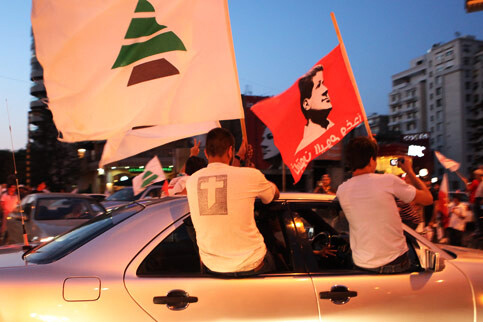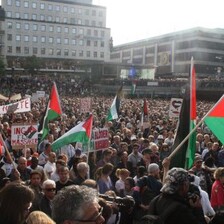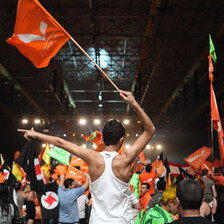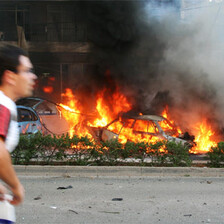Electronic Lebanon 7 July 2009

Phalange party supporters in Beirut celebrate the March 14 alliance’s victory in Lebanon’s June elections. (Matthew Cassel)
Lebanon’s elections last month confirmed yet again that in this tiny Mediterranean country, sectarian politics are paramount. Long gone from the collective consciousness are the lessons of the 15-year civil war that began as a political and class dispute and descended into sectarian enmity. Forgotten also are the post-war years that led up to the recent elections and were characterized by the ebb and flow of civil strife.
Many would argue that digging up the past, runs the risk of repeating it. But in Lebanon’s case, allowing the issues that propelled Lebanon into civil conflict to fester has not proved useful, either.
The Taif agreement, which effectively ended Lebanon’s civil war, stipulates that all of Lebanon’s civil war militias disband. Even though many of the country’s sectarian militias still hold onto some of their weapons, only Hizballah maintains a sizable military arsenal. Lebanon’s continuing occupation by Israel remains the main justification for Hizballah’s armed presence outside of the state’s apparatus. Hizballah’s arms are a particularly precarious issue that came to a head in May 2008 when Hizballah and its allies faced off with pro-government forces in the streets of Beirut.
It’s also no surprise that today many of those who take issue with the group’s weapons outside the state’s apparatus are members of sects that resent the growing political, economic and military power of the Shia in Lebanon. Much of this enmity towards Hizballah stems from the constituents of areas that have suffered considerably less from recent Israeli aggression against the country. This includes former supporters of the Phalange party, which was supported by Israel during the civil war, and openly backed Israel’s invasion in 1982 and the occupation of Lebanon’s south that ended in 2000.
Another dimension of the confessional mishmash is the sentiment among wide swaths of Lebanon’s Christian community that they are becoming demographically marginalized by an increasing population of Muslims, particularly the Shia and supporters of Hizballah. Since the last elections, held in 2005 on the heels of the assassination of Prime Minister Rafiq Hariri, different factions within the Christian political elite have chosen to deal with the issue by either allying themselves with the ballooning demographic reality of Lebanon’s Shia, or opposing it.
Michel Aoun — a former military commander and acting president — is supported by many Christians in Lebanon. Recently he sarcastically thanked US President Barack Obama for “likening the Maronite [Christian] protectorate in Lebanon to that of the pandas,” referring to the US president’s speech in Cairo. Aoun’s party, the Free Patriotic Movement, is part of the Hizballah-led parliamentary opposition. In turn, some have pointed to the schism within the Christian community as evidence that the political dynamics of Lebanon are beginning to overcome their sectarian deficiencies. The reality of the matter however is much less encouraging.
Aoun’s alliance with Hizballah is based solely on sectarian principles. At no point since he forged the alliance did he forgo the opportunity to remind anyone who would listen that he represented the “majority” of the Christian population, thus reinforcing the nature of the alliance as one between sects and not political partners. When I asked an MP in his coalition why he is allied with Hizballah when their platforms contradict on many points relating to reforms, he laughed and said that there are “no issue politics in Lebanon.” Even though Aoun’s party gained more seats than in the previous elections, mostly due to Lebanon’s archaic electoral law, that “majority” turned out to be nothing more than wishful thinking and selective analysis facilitated by Lebanon’s reluctance to conduct polling or a population census, for fear of upsetting the sectarian “balance” in the country.
Moreover, many of Aoun’s Christian supporters who were initially disenchanted with the party’s alliance with Hizballah opted to support the March 14 coalition, a loose allegiance of former warlords and business magnates who won the recent election in a landslide through monolithic clannish voting. Hizballah’s actions did not assist Aoun. Shortly before election day, Hassan Nasrallah, the head of Hizballah, made an inflammatory speech addressing the issue of last year’s 7 May events and called them “a glorious day.”
What was so glorious about Beirut being taken over by masked gunman from Hizballah and its allies? Or their pro-government rivals setting up ad hoc checkpoints, making sure that no “undesirables” with Shia first or last names entered their sectarian enclaves? Such a declaration defies the bounds of common sense. That is, unless you are of the camp that believes Hizballah never wanted to win the election in the first place. While that may seem illogical to most, it is a real possibility that Hizballah would rather not deal with a debt-ridden economy that currently holds a debt-to-gross domestic product ratio of 170 percent.
Instead, what is increasingly becoming evident is that Hizballah will be satisfied, at least for the time being, with “assurances” that any new government will not attempt to rid it of its military arsenal or infrastructure. Whether it was intentional or not, Hizballah certainly dampened the support for Aoun amongst Lebanon’s Christians, even if that support didn’t reach his purported “70 percent” in the first place.
For its part, Hizballah is as keen as any to embrace the sectarian realities of Lebanon for its own purposes. The Party of God completely overwhelmed its opponents in its strongholds of Lebanon’s southern and western regions with the practically uniform voting of the country’s Shia. What’s more, Hizballah continues to provide social services solely to its constituents, further cementing the dependence and loyalty of many in the Shia community on the party, not to mention adding fodder to its detractors’ “state within a state” argument.
Somewhere in the middle of all of this are Lebanon’s Sunnis. Although they never had a formidable militia of their own, Lebanon’s Sunnis do possess one discernible weapon that everyone in Lebanon recognizes very well — money. Propped up by Saudi petrodollars, the Sunnis have managed to “buy” their way into power. The Saudis — who have many interests in Lebanon, ranging from fighters sympathetic to their tutelage in the north to real estate investments all over Lebanon — put forward large amounts of money (estimates range from $400 million to $1 billion) in Lebanon’s recent elections to ensure that their piece of Lebanon’s sectarian pie would not be eaten up by anyone else. It proved to be a worthwhile investment for the kingdom as their local patrons, the Hariri family and its allies, won a decisive election victory. Saad Hariri, the son of the assassinated former prime minister and head of the party that holds the largest share of seats in the new parliament, has just become Lebanon’s prime minister-designate after only four years in politics and never having assumed a ministerial portfolio or having been involved in implementing any of Lebanon’s much-needed reforms.
As the sectarian wheels of Lebanon continue to turn, they pull along the ability of Lebanon’s political elite to rule through a perpetual hand-me-down system. Hereditary inheritance of political power occurs across party lines, especially in the new parliamentary majority. The ruling March 14 coalition now includes five sons of deceased politicians, one sister, one wife, one brother and one 26-year-old daughter, Nayla Tueni. Tueni, who has never held any occupation other than working at her father’s newspaper, An-Nahar, is against a minimum quota for women in parliament. Moreover, when asked what she was going to do about 28.5 percent of Lebanon’s population living below the poverty line, she requested to send me a response by email. In her response, which was a superficial one at best, she said she would focus her “efforts” on her electoral district — one of the most affluent districts in the entire country.
Who is to blame for this situation? Essentially, it is the people who continue to reinforce the system by electing the same representatives or their progeny time and time again. Yet, it is the people of Lebanon who suffer the most from the lack of basic services or a functioning state, not the “leaders” they continue to elect. The reluctance of most of Lebanon’s population to admit to themselves that the core issue hampering progress in their lives is not which tribal lord rules over them for the next four years, but an unwillingness to keep God, and the absolute truth that he embodies, out of government. This is what is keeping them and their country on the brink of disaster, and surely this new government will be no different.
Sami Halabi is a freelance journalist and political commentator based in Beirut who covers a variety of economic and political issues relating to the Middle East and in particular the Israeli-Palestinian conflict.





